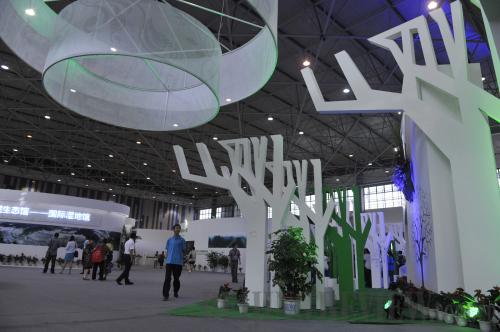|
 |
|
GREEN DEVELOPMENT: Visitors peruse an eco-product exhibition at the Eco-Forum Global on July 17 in Guiyang, capital of southwest China's Guizhou Province (OU DONGQU) |
"Cool Guiyang welcomes you," a phrase splashed across posters greeting visitors to the capital of southwest China's Guizhou Province, is a testament to the city's status as a self-proclaimed home to forestry and green living. Locals boast that Guiyang acts as a natural air conditioner to visitors during summer time, referring to the favorable eco-environment and pleasant climate. It was also this year's summer resort for the environmentally conscious, as host to an international conference on ecological conservation from July 19 to 21.
The conference, the Eco-Forum Global (EFG) in Guiyang, was first launched in 2009. It is China's first and only national-level forum focusing on the environment.
Designed to promote the sharing of knowledge and experience in the implementation of policies regarding green economic transformation and ecological security among international community members, the forum is well received by a global range of members. The 2013 annual meeting carried the theme of Building Eco-Civilization: Green Transformation and Transition and emphasized green industry, green urbanization and green consumption, attracting about 4,000 scholars, reporters, politicians as well as representatives from NGOs and multinationals.
During a media interview ahead of the event, former U.S. Secretary of State Henry Kissinger hailed the forum as a platform that will affect the future of humanity.
Zhang Xinsheng, head of the International Union for the Conservation of Nature and Natural Resources and Secretary General of the EFG, said that the upgrading of the forum to a national-level event this year shows China's commitment to its international obligations in promoting ecological conservation.
As the Chinese Government has incorporated building an eco-friendly society into its national development strategy alongside economic, political, cultural and social development, participants claim the forum is instructive of China's future development trends.
China's role
Ever since the first Declaration on the Human Environment was released in 1972 at the UN Conference on Human Environment, people have begun to realize that industrial revolution in the past 300 years has generated not only great material prosperity, but also great damage to world resources and the environment. And in 1992 during the Rio Summit, the UN Conference on Environment and Development upgraded sustainable development as a strategy of joint development for humankind, integrating for the first time economic development with environmental protection.
"Although global achievements have been made in the provision of healthcare, education and the alleviation of poverty in the past 20 years, progress has been very slow in terms of goals set by the Rio Summit," said Zhang. "And the world has been faced with increasing challenges in eco-security, climate change, biodiversity protection and sustainable development since then."
Therefore, Zhang said, achieving sustainable development and eco-conservation is no longer an option—it is an inevitable course of human development.
As the world's second largest economy and one of the largest emitters of greenhouse gasses, China's progress in eco-friendly initiatives concerns the future of the human race. Thus the EFG came into being to build a bigger platform for the shift to green and inclusive growth in the post-Rio era.
"The Chinese leadership is changing views and adopting international perspectives," said Patrick Haverman, Deputy Country Director of the UN Development Program in China. He added that such a forum is necessary because environmental problems cannot be solved by individuals or a single country.
Professor Jeffrey Sachs, Director of the UN Sustainable Development Solutions Network and a special advisor to UN Secretary General Ban Ki-moon on the Millennium Development Goals, affirmed during an introductory report at the forum that China plays a key role in promoting economic globalization and global sustainable development. China's achievement in reducing poverty has also contributed greatly to global development, he noted.
Participants lauded China's leading role in south-south climate change cooperation.
Su Wei, Director of the Climate Change Department of China's National Development and Reform Commission, said the country will continue to share its experience and consider setting up a south-south cooperation fund for climate change.
In one of these cooperation projects, China has promised to invest 200 million yuan ($32.6 million) since 2011 to help small island states and least developed countries tackle climate change.
| 